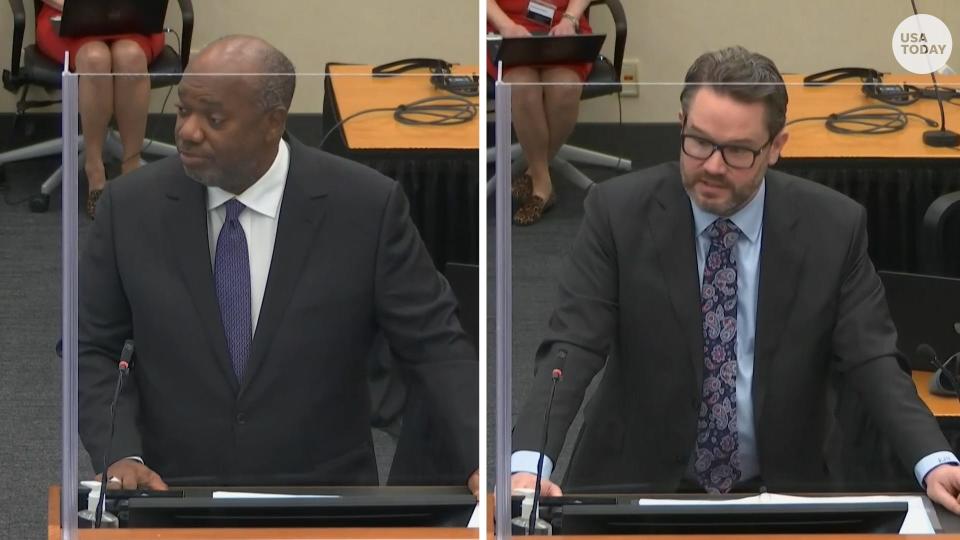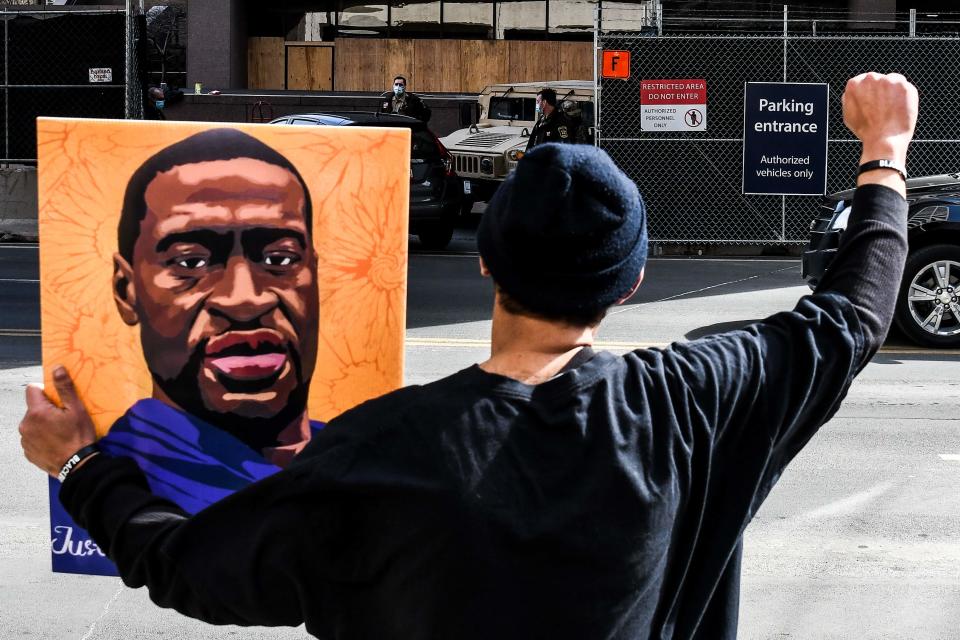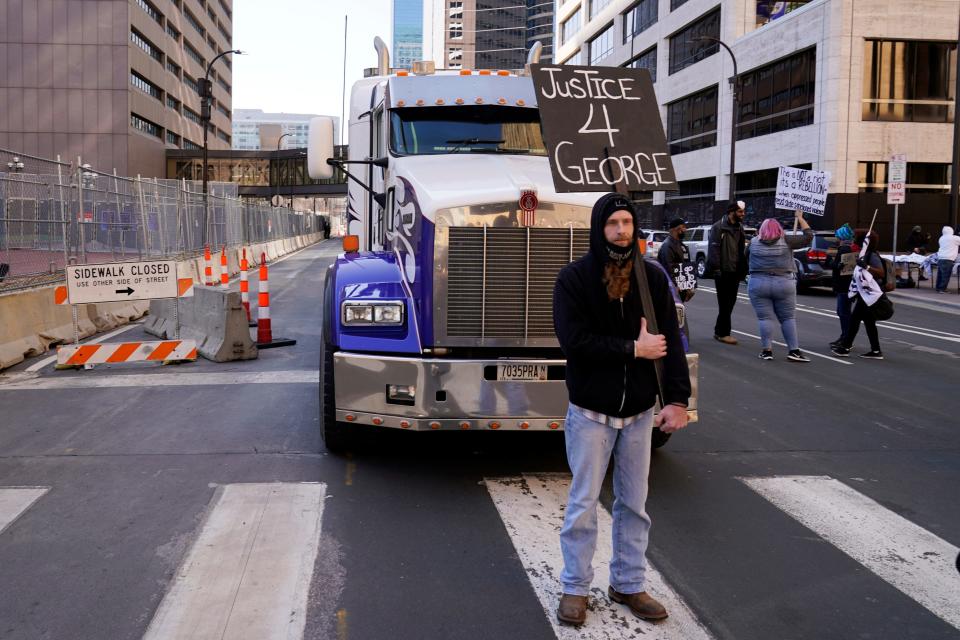'Excruciating': Video of officer kneeling on George Floyd's neck stands out in TV trial coverage
- Oops!Something went wrong.Please try again later.
Attorneys made their opening statements Monday in former Minneapolis police officer Derek Chauvin's murder trial, but the visual images of Chauvin with his knee on George Floyd's neck may have spoken loudest to viewers watching the trial on TV.
CNN correspondent Omar Jimenez, reporting from Minneapolis, noted the significance of the video clip, which ran 9 minutes and 29 seconds, longer than the 8 minutes and 46 seconds that's been a rallying cry for those seeking justice for Floyd, some of whom were gathered outside the courthouse.
Prosecution lawyer Jerry Blackwell "brought in the excruciating video that many had seen over the course of what has now been 10 months since George Floyd's death, but to play it out in full like that, I mean, you look no further than social media and even just our own visceral reaction. It was very difficult to watch. So you can imagine the impact that it had on the jurors sitting in that courtroom," Jimenez told anchor John King.
The level of TV coverage reflected the significance of the May 25 killing of Floyd while in police custody, which became the catalyst for protests and a larger cultural conversation about racial injustice and police brutality.
Powerful pictures: Prosecutors play disturbing video of George Floyd's final minutes as Derek Chauvin's murder trial opens

ABC, CBS and NBC broke into regular programming to cover the opening statements in the trial, as did cable and streaming networks CNN, Fox News, MSNBC, HLN, Newsmax, Court TV and Law & Crime Network. Several stationed correspondents outside the courthouse, monitoring community reaction.
Many networks aired the video – which was filled with profanities – uncensored, although several ran onscreen warnings about graphic content.
After Blackwell's roughly one-hour presentation and defense attorney Eric Nelson's 25-minute response on behalf of Chauvin, legal analysts offered tactical critiques.
Many, including NBC News legal contributor Paul Butler, noted the power of the video, recorded by a bystander as Chauvin kneeled on Floyd's neck on a Minneapolis street with other officers and witnesses standing nearby.
"The video tells the story more dramatically than any words can. The jury heard Floyd literally narrate his own death. The crowd begged Chauvin to take his knee off his neck," Butler said. "And the last two minutes of the video are the heart of the prosecution, because at that point, Mr. Floyd's pulse had stopped. Chauvin knew that and he continued to hold Floyd down."
Testimony begins: Derek Chauvin trial live: Disturbing video shown of George Floyd's death; 911 dispatcher had 'gut instinct' something was wrong
The video was so powerful that ABC News legal analyst Dan Abrams questioned Nelson's decision not to at least acknowledge it.
"I was a little surprised at the tone of Eric Nelson coming out of that video, because regardless of what you think, ultimately, about the cause of death, you have to be able to at least agree that watching that tape is really really hard to do," he said.
Rikki Klieman, a CBS News legal expert, noted that the defense tried to broaden the case, saying Floyd resisted arrest and had consumed drugs, but that it should have used its own visuals.
"The problem for the defense, whether it is brief or long, is how do you overcome that video? I think if I were defending Derek Chauvin, I would have been tempted to put in that body camera or that other surveillance footage that showed a battling George Floyd or the police car rocking back and forth. They needed to get over the power of that brilliant opening statement from the prosecution," she said. "And I'm not sure that just talking to them about facts would have really carried the day."

Civil rights attorney Leo Terrell, speaking on a Fox News Channel panel, disagreed with other analysts who suggested the prosecution should play the video repeatedly during the trial.
"The first day of a jury trial, you're trying to move the needle and what the defense said, 'We're going to show you all the evidence. We're going to make sure you see everything, so that you could get the total picture.' And I think the prosecution, by playing that nine-minute tape over and over again, they're going to make the jury numb to it," he said.
Besides the opening statements, coverage focused on another newsworthy angle: conducting a trial while complying with COVID-19 restrictions.

MSNBC's Shaquille Brewster, reporting from Minneapolis, listed some of the protocols in conversation with anchor Andrea Mitchell: socially distanced jury members, plexiglass partitions and a single representative of the Floyd and Chauvin families in the courtroom, along with just two news reporters. Nearly everyone wore masks.
"You also see sometimes there are sidebars where the judge will put on headphones, like a headset, (and) essentially confer with the lawyers. That's instead of a sidebar where you normally see the lawyers going up to the bench and having that private conversation," Brewster said. "Lots of precautions in place for the pandemic that we're under."
After the opening statements CNN, MSNBC, HLN, C-Span 2, Court TV and Law & Crime stayed with coverage as testimony began in what is expected to be a four-week trial. Others, including all three broadcast networks, returned to regular programming.
This article originally appeared on USA TODAY: Chauvin trial media coverage: Visceral video makes early impression

